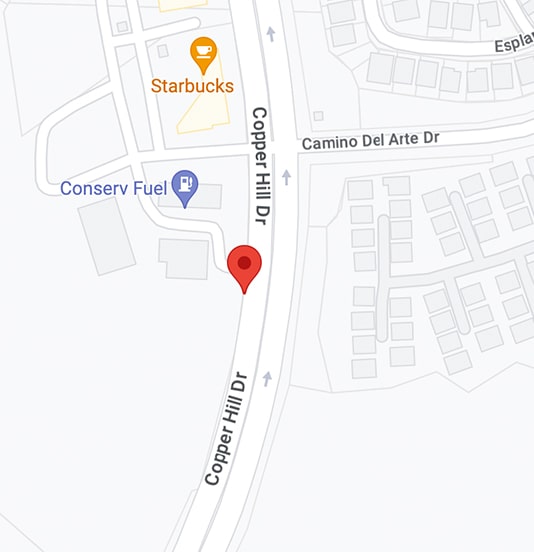A root canal procedure is a dental treatment that removes infected or inflamed pulp from inside the tooth. The dentist cleans the tooth, disinfects, fills, and seals it. Root canal treatment seeks to remove bacteria from the infected root canal, preventing reinfection and preserving the original tooth. There is no reason to worry if your dentist or endodontist recommends a root canal treatment for a damaged or infected tooth. Dentists treat and preserve millions of teeth annually using this procedure, alleviating pain and restoring tooth function. If you need reliable root canal treatment in Santa Clarita, CA, contact the Valencia Advanced Dentistry At Copperhill Smiles.
Understanding An Emergency Root Canal
When people think about emergency dentistry, root canals are rarely the first thing they think about. Perhaps a chipped tooth or some dental trauma caused by a vehicle accident, but not a root canal. Most people assume that a root canal is performed during a routine dental appointment and is rarely an emergency. However, this is not always true. While a root canal is not the first thing that comes to mind when considering a dental emergency, it can be an emergency.
A root canal is a common dental treatment that can salvage a tooth that is severely damaged or infected. It preserves your natural teeth by killing the nerves in the tooth to make it insensitive to pain. Instead of extracting your tooth, a root canal operation removes damaged nerve tissues and fills the hollow canal with gutta-percha. Gutta-percha is a plastic obtained from the renowned Malaysian percha tree. If you fail to treat an infected tooth, the tissue surrounding it will become infected, leading to a dental abscess and swelling within the tooth.
Why You Would Need Emergency Root Canal
Symptoms can occur due to complications of a dental infection that cannot be postponed or are incredibly challenging for the patient. It can disrupt daily life to the extent of interrupting the patient at school, work, or home, preventing the patient from engaging in daily tasks.
The patient can experience acute pain that extends beyond the affected tooth to the surrounding area. The patient could also experience discomfort when eating, and the tooth can be extremely sensitive to touch. Sometimes, a little red bump may appear near the affected tooth, indicating that an abscess is developing.
Experiencing any of these symptoms is bad enough. The situation could be more challenging if you experience several challenges at once. Here are signs that you need an emergency root canal:
Severe Toothache
If you have significant tooth pain that does not fade away after several hours, it could be a sign that you require emergency root canal treatment. Your tooth is probably infected, and the nerves inside the tooth are injured. This infection could spread to the oral cavity and jawbone. Consequently, it can cause severe tooth pain, gingivitis, or even a dental abscess that requires tooth extraction.
Sometimes, an infection in the root canal is not the source of tooth discomfort. Here are some additional possibilities:
- Broken tooth.
- Tooth decay.
- Gum disease.
- Loose or damaged fillings.
- Sinus-related toothache.
- Impacted wisdom teeth.
You should be open-minded and ensure that you seek treatment even if the pain subsides. An infection in your tooth could pose a risk if you experience a lack of sensation or a sudden numbness in the affected tooth. It is best to visit a dentist to determine whether you require an emergency root canal.
Sensitivity To Hot And Cold Foods And Beverages
Do you experience long-lasting pain and sensitivity after consuming hot or cold liquids and food? It could be another indication that you require an emergency root canal treatment. Patients with broken or chipped teeth could experience pain and sensitivity.
When you chew, bite, grind, or crunch your teeth, you should not experience sensitivity since the tooth enamel shields the teeth. However, if you have lost enamel, you will experience tooth pain and sensitivity when you eat or drink hot or cold foods. It could mean your tooth's blood vessels and nerves are damaged or infected.
You Have Swollen Gums
Swollen gums or a dental abscess close to the affected tooth could indicate that you need a root canal treatment. The infection usually starts in the tooth's inner pulp and can be caused by cavities or dental trauma. A dental abscess will not go away on its own. If not treated, the infection can spread to other parts of your body, posing a risk to your life.
The common symptoms of a dental abscess include:
- Toothache.
- Swollen gums or face.
- Fever.
- Pain while chewing.
- Foul-smelling breath.
- Pain in the jaw.
A Tooth Ache Accompanied By A Fever
Tooth root infections usually start with a dental cavity. When the bacteria multiply, they spread to the tooth's inner nerve and form an abscess, causing swelling. If you do not seek prompt treatment for the infection, it might spread to other parts of your body, causing you to experience a fever.
Antibiotics typically clear up infections. However, they can no longer be effective in some situations. You will most likely require root canal treatment if you have a toothache and a fever simultaneously. Do not wait for the problem to become worse. Call your dentist to schedule an appointment.
Darkened Teeth
If a couple of your teeth appear darker than others, this could indicate a pulp infection. When the tooth pulp has an infection, it can die since it does not receive sufficient blood flow or nutrients. A dead tooth pulp could make your teeth appear grayish-black.
You could need root canal therapy if you have significant symptoms, such as pain, tenderness, and gradual tooth discoloration.
Most patients who get a root canal do not have serious complications afterward. However, your long-term outlook is determined by how well you care for your teeth. Brush and floss your restored teeth regularly.
How A Root Canal Is Performed
Root canals are performed in a dental office as an outpatient procedure. A technician will accompany you to the treatment room when you arrive for the appointment. The technician will help you settle into a chair and wrap a bib around your neck to shield your clothes from stains.
Applying Anesthetic
The dentist will apply numbing medicine to your gums near the decaying tooth. After it has taken effect, a local anesthetic will be administered to your gums. You could experience a stinging pinch or burning feeling, but it goes away fast. You will be conscious throughout the treatment, but the anesthetic will prevent you from experiencing any pain.
Removing The Pulp
After numbing the affected tooth, the endodontist or regular dentist will create a small opening at the top. Once the damaged or infected pulp is exposed, the expert will gently extract it using special tools known as files. The dentist will take extra care when cleaning the pathways or canals in the tooth.
Using Antibiotics
After removing the pulp, the dentist can use a topical antibiotic to clear the infection and avoid reinfection. After cleaning and disinfecting the canals, the dentist will fill the hollow tooth using a sealer paste and a rubber-like substance known as gutta-percha. The dentist can also prescribe you an oral antibiotic.
Placing A Temporary Filling
The last stage involves using a temporary filling to close the small opening on the top of the tooth. The temporary sealant ensures that saliva does not damage the tooth.
What To Expect After A Root Canal Treatment
After the numbing medicine wears off, your teeth and gums can feel sore. Your gums could also swell. Most dentists advise addressing these symptoms with over-the-counter pain relievers such as ibuprofen or acetaminophen (Tylenol). Contact the dentist if the discomfort worsens or lasts longer than a few days.
You should return to your normal schedule the day after the root canal procedure. Avoid gnawing on the injured tooth until it is permanently filled or a crown is set on top.
After several days of having the root canal, you will return to your dentist. The dentist will take an X-ray to ensure that the infection is cleared. Then, your dentist will replace the temporary dental filling with a permanent one.
Sometimes, the dentist can put a permanent crown on the treated tooth. Dental crowns are prosthetic teeth comprised of either porcelain or gold. The advantage of a dental crown is its authentic appearance.
Following the procedure, it can take several weeks to get used to your tooth's feelings. This feeling is normal and should not be a cause for alarm.
Risks Of Root Canal Treatment
A root canal procedure is carried out to save a tooth. However, in some cases, the damage is too severe or the tooth enamel is too fragile to endure the procedure. These and other factors can cause tooth decay.
Another possible risk of a root canal treatment is developing a dental abscess. An abscess can develop at the tooth's root if part of the diseased tissue is left behind or the dentist's antibiotics are ineffective.
If you are concerned about having a root canal, you can discuss an extraction with your dentist. A bridge, partial denture, or implant often replaces the damaged tooth.
A root canal is a restorative dental procedure. Most patients can enjoy positive outcomes for the rest of their lives after undergoing root canal treatment. However, how long the results of a root canal treatment last will depend on how well you take care of the restored teeth. Like the rest of the teeth, your restored tooth has to be brushed and flossed regularly.
Whether An Emergency Root Canal Hurts
Emergency root canal therapy sounds frightening but is comparable to receiving a dental filling. Your dentist will administer local anesthesia so you do not experience any pain during the treatment. If you experience facial swelling or fever due to the infection, your dentist could give you antibiotics to help fight the infection and alleviate the pain.
While an emergency root canal procedure is similar to receiving a tooth filling, it takes much longer. The dentist must clean the decaying pulp, disinfect the tooth roots, and fill them.
With regular oral hygiene, discomfort or pain from the treatment should last only a few days. Because the pain from a root canal procedure is usually mild, you will likely only require over-the-counter pain relievers like acetaminophen or ibuprofen. If the pain lasts over three days, consult your dentist for a check-up.
It is also crucial to avoid eating hard foods shortly after the procedure, as this could exacerbate the pain.
Managing Root Canal Pain
If you have dental sensitivity or discomfort, there are a few methods you can use to relieve it at home:
- Using over-the-counter medication like Tylenol and Advil.
- Placing a cold compress or ice pack over the tender area.
- Applying a cold compress on the inside of your jaw.
- Swishing warm, salty water in your mouth.
- You can soak a cotton ball in apple cider vinegar and then press it on the affected tooth gently.
How You Can Avoid An Emergency Root Canal
If you properly care for your teeth daily and see your dentist every six months, you are less likely to need an emergency root canal. Maintaining proper dental hygiene is the most effective strategy for eliminating the need for root canal therapy.
Take the following precautions to avoid an emergency root canal:
Brush Your Teeth Twice Daily
Keep your teeth clean and healthy to avoid cavities that eventually lead to root canals. Brush your teeth for at least two minutes twice daily or after every meal. When brushing, ensure you include your tongue, gums, and the inner part of your cheeks.
Floss Your Teeth At Least Once Daily
Brushing your teeth is not all because it does not reach some places. However, flossing helps eliminate plaque, bacteria, and food particles between your teeth. The best time to floss is just before bedtime. When you do this, your teeth remain clean for several hours. Floss your teeth at least once daily.
Use Fluoridated Toothpaste Or Mouthwash
Fluoride toothpaste or mouthwash protects against tooth decay and caries by hardening the enamel layer and eliminating plaque. Brushing or rinsing with fluoride mouthwash twice daily is a simple and cost-effective way to prevent an emergency root canal.
Wearing A Mouth Guard
Are you a physically active individual? If so, consider using a mouth guard to safeguard your teeth against fractures. Accidents could occur whether you are engaging in sports or undertaking other activities.
The same applies to persons who grind or clench their teeth in their sleep. When you grind your teeth or suffer from TMJ disorder, the enamel rapidly wears away, leaving your teeth irritated and sensitive. A dental night guard preserves your enamel by creating a barrier between your teeth. Your dentist can create customized dental night guards that fit comfortably and do not disturb patients’ sleep.
Have Your Cavities Filled
If you have a large hole or cavity in one of your teeth, have it filled. Sometimes, your dentist can recommend filling cavities for moderate tooth decay. Perhaps the cavities have not reached the pulp of your tooth. In this case, you will not require a root canal procedure.
Limit Your Consumption Of Acidic And Sweet Drinks And Foods
Sugar is food to the many bacteria living in the mouth. When oral bacteria devour sugar and release acid, the enamel of your teeth deteriorates, and cavities develop. To avoid cavities, restrict your intake of acidic drinks and sugary foods. Some of the foods can stick to the teeth, causing cavities. You should rinse your mouth immediately if you consume sugary foods and drinks.
The Cost Of A Root Canal Treatment
The cost varies according to the complexity of the disease and the damaged tooth. Molars are more challenging to treat; hence, the treatment cost is usually higher. Most dental insurance policies include specific coverage for endodontic therapy.
Endodontic procedures and repair of natural teeth are typically more affordable than having the tooth pulled. An extracted tooth must be replaced with a dental implant or bridge to restore its chewing ability and keep adjacent teeth from moving. These tooth replacement procedures typically cost more than an endodontic procedure.
Endodontic therapy allows you to keep your natural smile, consume the foods you enjoy, and reduce the need for future dental treatment. With the proper care, most root canal-treated teeth will endure a lifetime.
Find A Reliable Dentist Near Me
When the symptoms of a severely infected tooth surface, it is critical to have the tooth examined immediately. While some individuals will postpone because their condition does not feel like a dental emergency, delaying a crucial procedure is not the best way to care for your oral health. You should contact a dentist even if your pain is not overly severe.
If you are in pain and there are obvious indicators of a severe infection, heed the messages your body is giving you. Do not wait. Signs of infection include tooth discoloration, swollen gums, and abscesses forming near the affected area. The sooner an infected tooth is treated, the more issues can be prevented. Contact Valencia Advanced Dentistry At Copperhill Smiles today for reliable dental services in Santa Clarita, CA. Call us at 661-775-7717 to speak to one of our dentists.




